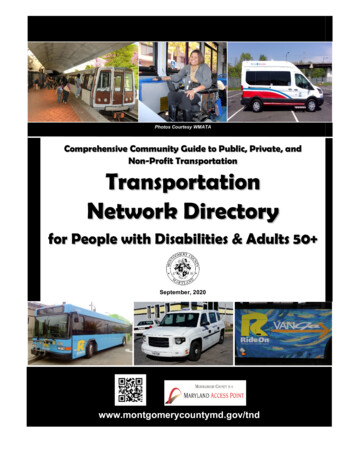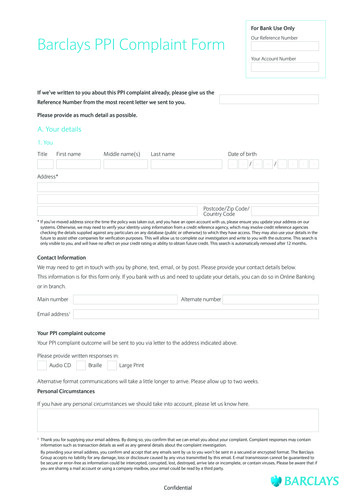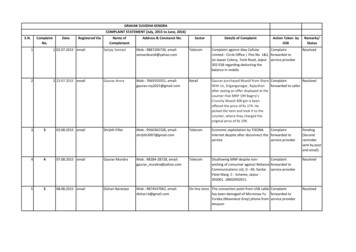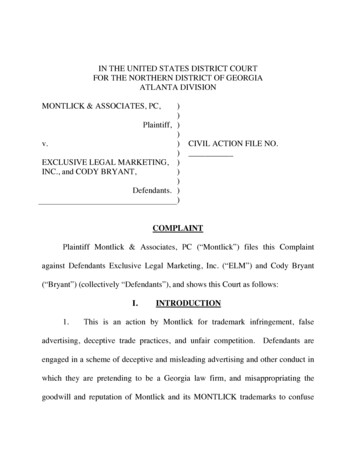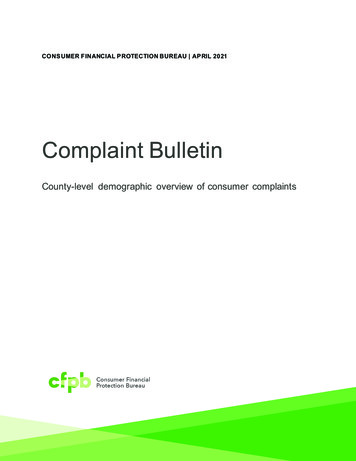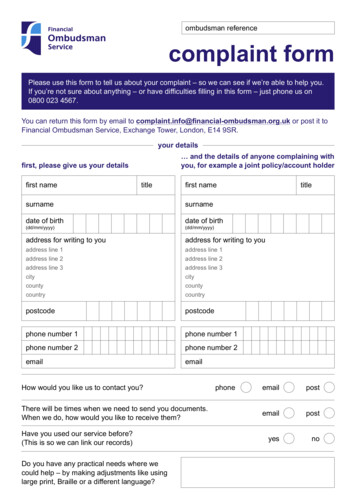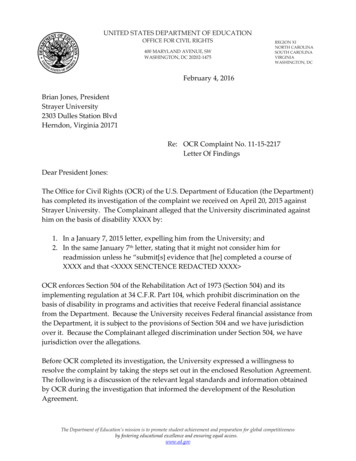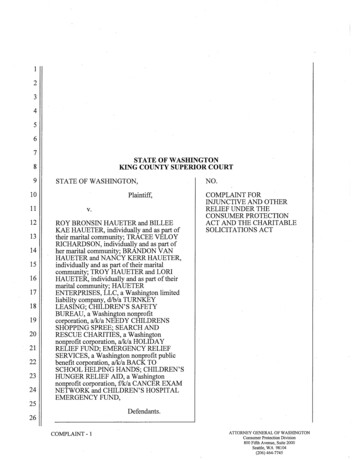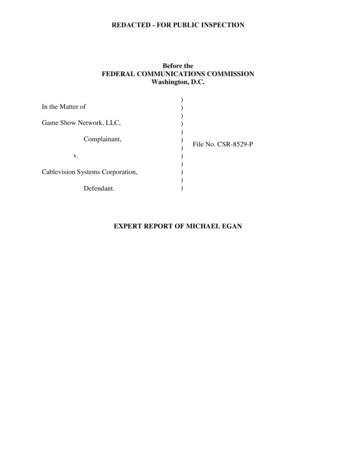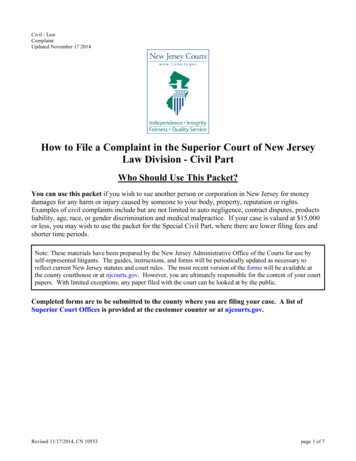
Transcription
Civil - LawComplaintUpdated November 17 2014How to File a Complaint in the Superior Court of New JerseyLaw Division - Civil PartWho Should Use This Packet?You can use this packet if you wish to sue another person or corporation in New Jersey for moneydamages for any harm or injury caused by someone to your body, property, reputation or rights.Examples of civil complaints include but are not limited to auto negligence, contract disputes, productsliability, age, race, or gender discrimination and medical malpractice. If your case is valued at 15,000or less, you may wish to use the packet for the Special Civil Part, where there are lower filing fees andshorter time periods.Note: These materials have been prepared by the New Jersey Administrative Office of the Courts for use byself-represented litigants. The guides, instructions, and forms will be periodically updated as necessary toreflect current New Jersey statutes and court rules. The most recent version of the forms will be available atthe county courthouse or at njcourts.gov. However, you are ultimately responsible for the content of your courtpapers. With limited exceptions, any paper filed with the court can be looked at by the public.Completed forms are to be submitted to the county where you are filing your case. A list ofSuperior Court Offices is provided at the customer counter or at njcourts.gov.Revised 11/17/2014, CN 10553page 1 of 7
Civil -Law, ComplaintThings to Think About Before You Represent Yourself in CourtTry to Get a LawyerThe court system can be confusing and it is a goodidea to get a lawyer if you can. The law, the proofsnecessary to present your case, and the proceduralrules governing cases in the Law Division, Civil Partare complex. Since valuable claims or potentiallyheavy judgments may be at stake, most litigantsappearing in the Law Division, Civil Part have alawyer. If you are being sued, please contact yourinsurance company to see if they might provide alawyer for you. Most likely your opponent will berepresented by a lawyer. It is recommended that youmake every effort to obtain the assistance of alawyer. If you cannot afford a lawyer, you maycontact the legal services program in your county tosee if you qualify for free legal services. Theirtelephone number can be found online under “LegalAid” or “Legal Services.”If you do not qualify for free legal services and needhelp in locating an attorney, you can contact the barassociation in your county. Most county barassociations have a Lawyer Referral Service. TheCounty Bar Lawyer Referral Service can supply youwith the names of attorneys in your area willing tohandle your particular type of case and willsometimes consult with you at a reduced fee. Thereare also organizations of minority lawyersthroughout New Jersey, as well as organizations oflawyers who handle specialized types of cases. Askyour county court staff for a list of lawyer referralservices that include these organizations.If you decide to proceed without an attorney, thesematerials explain the procedures that must befollowed to have your papers properly filed andconsidered by the court. These materials do notprovide information on the law governing yourclaims or defenses; information on how to conductpretrial discovery; information on alternative disputeresolution procedures, such as arbitration ormediation, that may be available or required in yourcase; information on the kinds of evidence you needto prove your claims or defense at trial; orinformation on other procedural and evidentiaryrules governing civil law suits.Revised 11/17/2014, CN 10553What You Should Expect If You RepresentYourselfWhile you have the right to represent yourself incourt, you should not expect special treatment, helpor attention from the court. The following is a list ofsome things court staff can and cannot do for you.Please read it carefully before asking court staff forhelp. We can explain and answer questions about howthe court works.We can tell you what the requirements are tohave your case considered by the court. We can give you some information from yourcase file. We can provide you with samples of court formsthat are available. We can provide you with guidance on how tofill out forms. We can usually answer questions about courtdeadlines. We cannot give you legal advice. Only yourlawyer can give you legal advice.We cannot tell you whether or not you shouldbring your case to court. We cannot give you an opinion about what willhappen if you bring your case to court. We cannot recommend a lawyer, but we canprovide you with the telephone number of alocal lawyer referral service. We cannot talk to the judge for you about whatwill happen in your case. We cannot let you talk to the judge outside ofcourt. We cannot change an order issued by a judge.Keep Copies of All PapersMake and keep copies of all completed forms anddocuments related to your case.page 2 of 7
Civil -Law, ComplaintOverviewA civil suit begins with the filing of a complaint and civil case information statement (CIS) with the appropriatefiling fee. Within 10 days of the filing of the complaint, the plaintiff will receive a Track Assignment Notice(TAN). A case is assigned to one of four tracks depending on the type of case and the length of time it shouldtake to complete discovery. The complaint, CIS and TAN must be served with the summons on all parties.Defendant must file an answer to the complaint along with the appropriate filing fee within 35 days after serviceof the complaint.After the complaint is served and an answer is filed, the discovery period begins. The time for discovery dependson what track the case is assigned to. During the discovery period, the parties exchange information about thecase. At any time during the case, a party may make a motion to the court for some specific relief.Prior to a trial, cases may be sent to mediation (a meeting in which a neutral third party facilitates discussionbetween the parties to reach a resolution of their differences) and/or arbitration (a hearing in which parties presenttheir positions to a neutral third party who makes a recommendation for resolving the case which may be acceptedor rejected by the parties). If mediation and/or arbitration is unsuccessful, a case will be scheduled for trial.The trial may take place before the judge alone or before a judge and a jury. At the trial, both sides presentevidence supporting their positions. The decision of the judge and/or jury is contained in the final judgment. If aparty wishes to appeal the final decision, a notice of appeal must be filed in the Appellate Division within 45 daysafter the entry of the final judgment.Definitions of Words Used in This PacketAffidavit of Merit - The Court Rules require that a plaintiff in a medical or professional malpractice case filean Affidavit of Merit by a neutral expert asserting that the defendant’s performance was below the standards ofthe profession.Caption - A caption is the name of the case; it lists the name of the plaintiff(s) and the defendant(s). Forexample, John Jones, Plaintiff v. Mary Smith, Defendant.Certification - A certification is statement that certain facts are true to the best of the knowledge of the personmaking the statement. It is like an affidavit, but is not sworn before a notary or other authorized person.Certification of No Other Actions - A certification of no other actions is a sworn written statement at the endof the complaint in which you state that, to the best of your knowledge, the action about which you arecomplaining is not the subject of any other court matter or arbitration, that there are no other parties that needto be added to this action and that you recognize the obligation to notify all parties and the court if there are anychanges.Civil Action - A Civil Action is a noncriminal case in which one individual or business sues another individualor business. To protect or enforce a right.Civil Case Information Statement (CIS) The CIS is a form that summarizes your case for the court. Courtrules require that a CIS be filed with a verified complaint. The pro se version of the CIS which is to be usedwith this packet can be found on our Self Help Center.Complaint - A complaint is a document in which the plaintiff tells the court his or her version or perspectivethe facts of a case and states what relief is sought.Defendant - The defendant is the person or entity being sued.Revised 11/17/2014, CN 10553page 3 of 7
Civil -Law, ComplaintDefinitions of Words Used in This Packet (continued)Docket Number - A docket number is the number the court assigns to your case so that it may be identifiedand located easily. Once you have a docket number, you must include it on all your communications with thecourt.File - To file means to give the appropriate forms and fee to the court to begin the court’s handling of yourcase.Jury - A jury in a civil matter is usually a group of six people selected according to law and sworn to inquireinto and decide the facts at issue in a trial.Motion – A motion is an application to the court for a specific order or ruling to be made in favor of the partyfiling the motionParty - A party is any plaintiff or defendant in a case. You must send a copy of everything you send to thecourt to every party.Plaintiff - The plaintiff is the person who files the first complaint with the court.Proof of Mailing - Proof of mailing is the form in which you provide the dates and method you used to givethe other parties copies of the papers that you filed in court.Pro se - Pro se is a Latin term that means “on one’s own behalf.” A plaintiff or defendant in a law suit whodoes not have an attorney is said to be appearing pro se.Service - Service refers to the delivery of the complaint or any other paper in a suit to the defendant and otherparties. Formal legal service requires that the service be made by an officially authorized person or by mail.Team - A team is made up of courthouse staff who are responsible for the processing of your case. Each teamis headed by a team leader who reports to the Civil Division Manager.Track - Lawsuits in the Civil Division are assigned to one of four tracks. Which track a case is assigned tousually depends on the type of case and how much time it should take to complete discovery. On the back ofthe CIS is a listing of the tracks and the various case types that are included in each one.Track Assignment Notice (TAN) - The Track Assignment Notice (TAN) is a document prepared by the courtthat tells you what judge and team will be handling your case. It also gives the telephone number you shouldcall whenever you need to reach the court about your case. The plaintiff is required to send a copy of the TANto everyone being sued.Venue - Venue refers to the county where the court that has jurisdiction to hear your case is located.Revised 11/17/2014, CN 10553page 4 of 7
Civil -Law, ComplaintThe numbered steps listed below tell you what forms you will need to fill out and what to do with them. Each form should be typed orprinted clearly on 8 ½ “x 11” white paper only. Forms may not be filed on a different size or color paper.Steps for Filing a ComplaintSTEP 1: Fill out the Complaint (Form A).The Complaint tells the court the facts of your case andwhat relief you want the court to give you. A judge willdecide your case unless you request to have a jury hearit. Sign and date all sections except the demand for ajury. Complete that section only if you would like a juryto decide your case.STEP 2: Fill out the Civil Case Information Statement(CIS).The Civil CIS form with instructions can be found onour Self Help Center. The completed CIS must be filedwith the complaint. Failure to file this requireddocument may result in the return of your complaint.STEP 3: Make a check or money order payable toTreasurer, State of New Jersey in the amount of 250.00.This is the fee for filing your papers.STEP 4: Check your completed forms and makecopies.Check your forms and make sure they are complete.Remove all instruction sheets. Make sure you havesigned all the forms wherever necessary. You also needto make three copies of each form. Two of the copieswill be sent to the court; the other is for your records.If the Complaint (Form A) or any of the copies of papersthat you attach to the Complaint contain a SocialSecurity number, driver’s license number, vehicle platenumber, insurance policy number, active financialaccount number, active credit card number, or militarystatus you must redact (black out) this information sothat it cannot be seen, unless any such personal identifieris required to be included by statute, rule, administrativedirective or court order. If an active financial account isthe subject of your case and cannot otherwise beidentified, you may use the last four digits of the accountto identify it.NOTE: Do not redact (black out) this information inthe original papers that you are keeping (such as a policeaccident report) since you may have to show them to thecourt at some point.Revised 11/17/2014, CN 10553Checklist - In Step 5 you will be directed to mail yourdocuments to the court. The following checklist willhelp ensure your package is complete:The original and two copies of theComplaint and CISA money order or check made out to theTreasurer, State of New Jersey in the amountof 250 to cover the filing feeA stamped envelope addressed to yourself sothat the court will be able to return the formsto you.STEP 5: Mail or deliver the forms to the court.You may deliver your papers to the court clerk in personor you may mail them. The court address is stamped onthe front of this guide or is available on the Judiciary’swebsite, njcourts.gov. If you mail the papers, werecommend that you use certified mail, return receiptrequested. Mail or deliver to the court the original and 2copies of the Complaint and CIS.Note: The court will return copies to you along with aTrack Assignment Notice (TAN). If you have anyquestions, you should contact the team leader at thenumber on the TAN. Copies of the Complaint, CIS, andTAN along with a Summons must be servedimmediately on every person you are suing in this case.The court rules permit a pro se plaintiff to issue thesummons and sign it in the name of the Clerk of theSuperior Court. The summons alerts the defendant thatyou have filed a complaint and provides information onwhat the defendant may do to reply to your complaint.The summons form is available on the Judiciary’swebsite, njcourts.gov. You will have to enter your nameand address as the pro se plaintiff, the caption for thecase, the name of the county where the case is filed andthe case docket number. You may also sign theSuperior Court Clerk’s name in the space provided andsupply the name and address of the defendant to beserved. The Superior Court Clerk’s name can be foundon the Judiciary’s website, njcourts.gov. To serve thedefendant(s) properly, you should contact the sheriff inthe county in which your suit is filed or a process server.The sheriff’s telephone number can be obtained fromDirectory Assistance. If you do not have yourcomplaint, CIS, TAN, and summons served immediately,your complaint may be dismissed. You may serve adefendant by registered, certified, or ordinary mail, butthis service is effective only if the defendant answers thecomplaint or otherwise appears in response to thecomplaint.page 5 of 7
SaveForm APrintClearPlaintiff or Filing Attorney Information:NameNJ Attorney ID NumberAddressTelephone Number,Plaintiff,v.Superior Court of New JerseyDivisionCountyPartDocket No:(to be filled in by the court)Civil ActionComplaint,Defendant(s).Plaintiff,, residing at(your name), City of(your address)County of.(your county)(your city or town)State Of New Jersey, complaining of defendant, states as follows:1. On, 20,(name of person being sued), Defendant(Summarize what happened that resulted in your claim against the defendant. Use additional pages if necessary.)The defendant in this action resides atIn the County of(defendant’s address)(name of county where defendant lives),, State of New Jersey.2. Plaintiff is entitled to relief from defendant under the above facts.Revised 11/17/2014, CN 10553Revised 11/01/2013, CN 11210page 6 of 7
Form A3. The harm that occurred as a result of defendant’s acts include: (list each item of damage and injury)1.2.3.Wherefore, plaintiff requests judgment against defendant for damages, together with attorney’s fees, ifapplicable, costs of suit, and any other relief as the court may deem proper.Dated:Signature:CERTIFICATION OF NO OTHER ACTIONSI certify that the dispute about which I am suing is not the subject of any other action pending in anyother court or a pending arbitration proceeding to the best of my knowledge and belief. Also, to the bestof my knowledge and belief no other action or arbitration proceeding is contemplated. Further, otherthan the parties set forth in this complaint, I know of no other parties that should be made a part of thislawsuit. In addition, I recognize my continuing obligation to file and serve on all parties and the courtan amended certification if there is a change in the facts stated in this original certification.Dated:Signature:OPTIONAL: If you would like to have a judge decide your case, do not include the following paragraph inyour complaint. If you would prefer to have a jury to decide your case, please sign your name after thefollowing paragraph.JURY DEMANDThe plaintiff demands trial by a jury on all of the triable issues of this complaint, pursuant to New Jersey CourtRules 1:8-2(b) and 4:35-1(a).Dated:Revised 11/17/2014, CN 10553Revised 11/01/2013, CN 11210Signature:page 7 of 7
Revised 11/17/2014, CN 10553 page 1 of 7 Civil - Law Complaint Updated November 17 2014 How to File a
